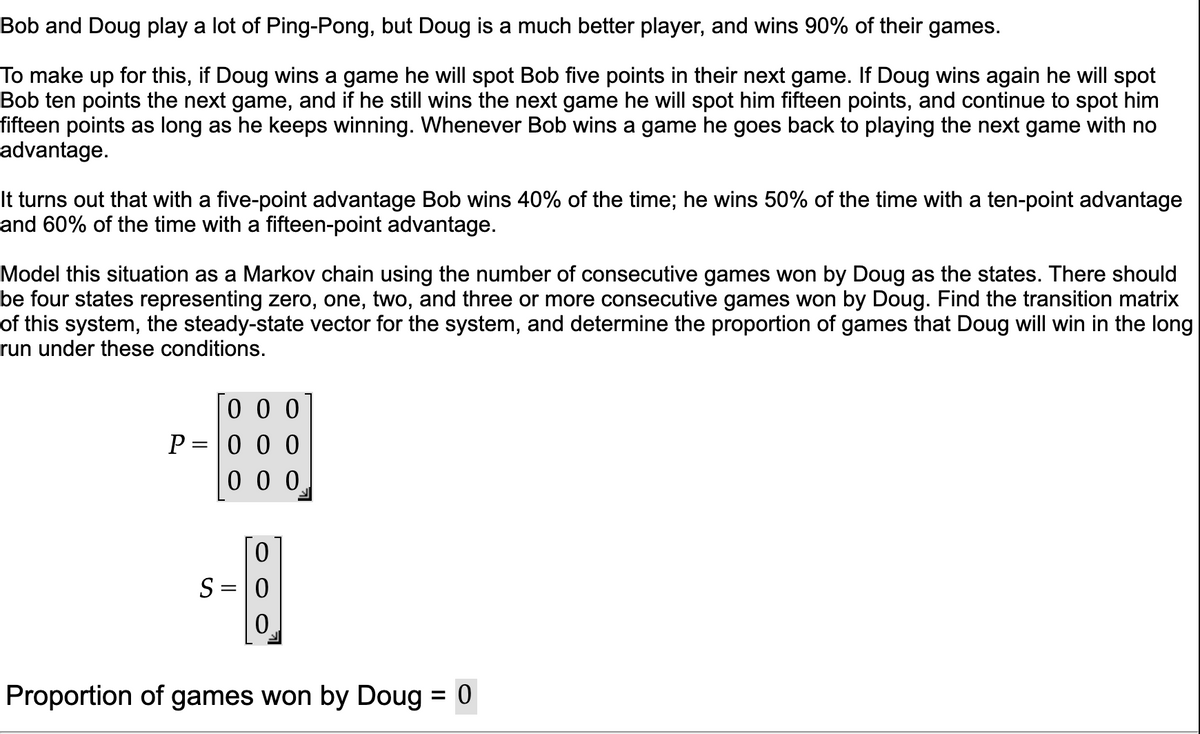Bob and Doug play a lot of Ping-Pong, but Doug is a much better player, and wins 90% of their games. To make up for this, if Doug wins a game he will spot Bob five points in their next game. If Doug wins again he will spot Bob ten points the next game, and if he still wins the next game he will spot him fifteen points, and continue to spot him fifteen points as long as he keeps winning. Whenever Bob wins a game he goes back to playing the next game with no advantage. It turns out that with a five-point advantage Bob wins 40% of the time; he wins 50% of the time with a ten-point advantage and 60% of the time with a fifteen-point advantage. Model this situation as a Markov chain using the number of consecutive games won by Doug as the states. There should be four states representing zero, one, two, and three or more consecutive games won by Doug. Find the transition matrix of this system, the steady-state vector for the system, and determine the proportion of games that Doug will win in the long run under these conditions. 0 0 0 P = 0 0 0 0 0 0 S =|0 Proportion of games won by Doug = 0 %3D
Bob and Doug play a lot of Ping-Pong, but Doug is a much better player, and wins 90% of their games. To make up for this, if Doug wins a game he will spot Bob five points in their next game. If Doug wins again he will spot Bob ten points the next game, and if he still wins the next game he will spot him fifteen points, and continue to spot him fifteen points as long as he keeps winning. Whenever Bob wins a game he goes back to playing the next game with no advantage. It turns out that with a five-point advantage Bob wins 40% of the time; he wins 50% of the time with a ten-point advantage and 60% of the time with a fifteen-point advantage. Model this situation as a Markov chain using the number of consecutive games won by Doug as the states. There should be four states representing zero, one, two, and three or more consecutive games won by Doug. Find the transition matrix of this system, the steady-state vector for the system, and determine the proportion of games that Doug will win in the long run under these conditions. 0 0 0 P = 0 0 0 0 0 0 S =|0 Proportion of games won by Doug = 0 %3D
College Algebra (MindTap Course List)
12th Edition
ISBN:9781305652231
Author:R. David Gustafson, Jeff Hughes
Publisher:R. David Gustafson, Jeff Hughes
Chapter6: Linear Systems
Section6.8: Linear Programming
Problem 5SC: If during the following year it is predicted that each comedy skit will generate 30 thousand and...
Related questions
Question

Transcribed Image Text:Bob and Doug play a lot of Ping-Pong, but Doug is a much better player, and wins 90% of their games.
To make up for this, if Doug wins a game he will spot Bob five points in their next game. If Doug wins again he will spot
Bob ten points the next game, and if he still wins the next game he will spot him fifteen points, and continue to spot him
fifteen points as long as he keeps winning. Whenever Bob wins a game he goes back to playing the next game with no
advantage.
It turns out that with a five-point advantage Bob wins 40% of the time; he wins 50% of the time with a ten-point advantage
and 60% of the time with a fifteen-point advantage.
Model this situation as a Markov chain using the number of consecutive games won by Doug as the states. There should
be four states representing zero, one, two, and three or more consecutive games won by Doug. Find the transition matrix
of this system, the steady-state vector for the system, and determine the proportion of games that Doug will win in the long
run under these conditions.
0 0 0
P=|0 0 0
0 0 0
S = 0
0.
Proportion of games won by Doug = 0
Expert Solution
This question has been solved!
Explore an expertly crafted, step-by-step solution for a thorough understanding of key concepts.
This is a popular solution!
Trending now
This is a popular solution!
Step by step
Solved in 2 steps with 2 images

Recommended textbooks for you

College Algebra (MindTap Course List)
Algebra
ISBN:
9781305652231
Author:
R. David Gustafson, Jeff Hughes
Publisher:
Cengage Learning

Linear Algebra: A Modern Introduction
Algebra
ISBN:
9781285463247
Author:
David Poole
Publisher:
Cengage Learning

Glencoe Algebra 1, Student Edition, 9780079039897…
Algebra
ISBN:
9780079039897
Author:
Carter
Publisher:
McGraw Hill

College Algebra (MindTap Course List)
Algebra
ISBN:
9781305652231
Author:
R. David Gustafson, Jeff Hughes
Publisher:
Cengage Learning

Linear Algebra: A Modern Introduction
Algebra
ISBN:
9781285463247
Author:
David Poole
Publisher:
Cengage Learning

Glencoe Algebra 1, Student Edition, 9780079039897…
Algebra
ISBN:
9780079039897
Author:
Carter
Publisher:
McGraw Hill

Algebra and Trigonometry (MindTap Course List)
Algebra
ISBN:
9781305071742
Author:
James Stewart, Lothar Redlin, Saleem Watson
Publisher:
Cengage Learning